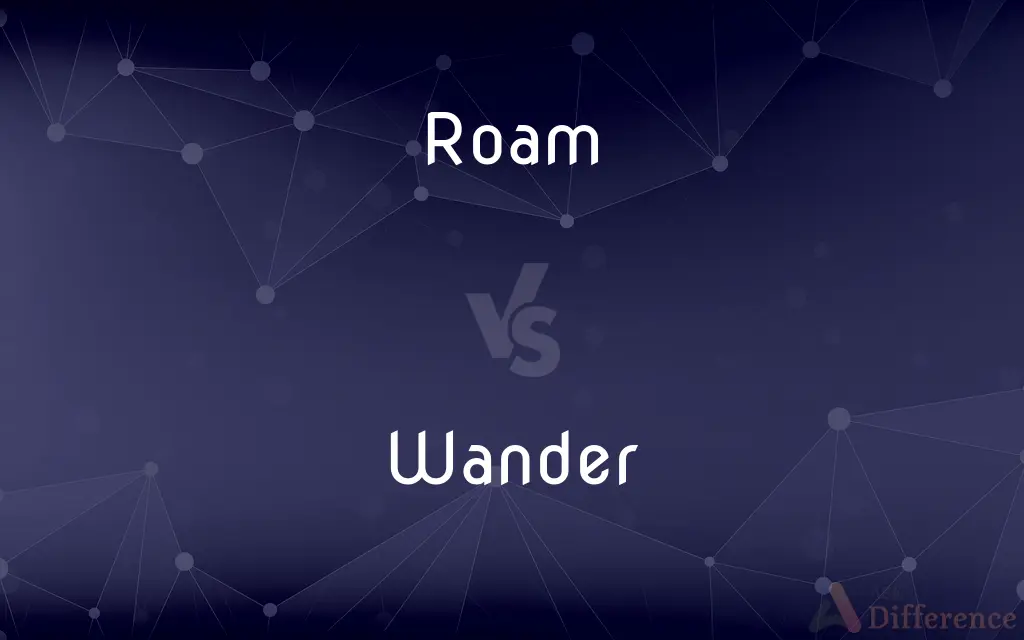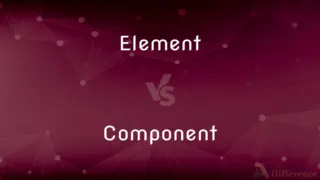Roam vs. Wander — What's the Difference?
By Tayyaba Rehman — Updated on September 16, 2023
Roam implies moving about without a fixed direction or purpose, while Wander often suggests walking or moving leisurely or aimlessly.

Difference Between Roam and Wander
Table of Contents
ADVERTISEMENT
Key Differences
Both Roam and Wander describe movement without a specific goal. However, Roam often conveys a broader sense of movement, perhaps over vast distances or areas, whereas Wander usually depicts a more localized, leisurely, or aimless meandering.
Animals Roam in the wild, covering vast territories in search of food or mates. On the other hand, one might Wander through a park or city street, moving without haste or specific purpose, simply enjoying the surroundings.
While Roam can sometimes have a more neutral or even positive connotation, suggesting freedom or exploration, Wander might occasionally imply confusion or being lost. Someone might Roam a continent during a gap year, while an elderly person might Wander off and need assistance.
Digital terminology also uses the word Roam, as in "roaming charges" for cell phones when one uses their mobile device outside of their usual service area. Wander, however, remains more tied to its traditional, physical sense of movement.
In essence, while both Roam and Wander hint at movement without a strict objective, Roam often suggests a broader or more extensive movement, while Wander leans toward unhurried or aimless motion.
ADVERTISEMENT
Comparison Chart
Scope
Can be over vast distances/areas
More localized, leisurely movement
Connotation
Often positive (freedom, exploration)
Can imply aimlessness or confusion
Usage
Broader contexts, including digital
Mainly physical movement
Speed/Intent
Neutral speed, often purposeful
Slower, often aimless
Examples of Context
Animals in nature, cell phone service
Meandering through a park or lost individuals
Compare with Definitions
Roam
To travel freely without restriction.
She loved to Roam the world and explore new cultures.
Wander
To roam leisurely or aimlessly.
She liked to Wander through the city's old alleys.
Roam
To move without confinement.
Cattle Roam freely in the open pasture.
Wander
To move without a fixed direction.
He would Wander the forest, listening to the sounds of nature.
Roam
To use a mobile device outside its primary service area.
Be cautious of Roam charges when traveling abroad.
Wander
To deviate from a standard or norm.
His thoughts Wandered to unconventional territories.
Roam
"Roam" is a song by the B-52's. It was released as the fourth single from their 1989 album, Cosmic Thing, following "(Shake That) Cosmic Thing", "Channel Z", and "Love Shack".
Wander
Walk or move in a leisurely or aimless way
I wandered through the narrow streets
Roam
To move about without purpose or plan; wander.
Wander
Move slowly away from a fixed point or place
His attention had wandered
Please don't wander off again
Roam
To turn the attention from one subject to another with little clarity or coherence of thought
I could hear the speaker, but my thoughts were roaming.
Wander
Be unfaithful to one's regular sexual partner
He had married her and he was not going to be allowed to wander
Roam
To move or pass over the body
His hands roamed over her body.
Wander
An act or instance of wandering
She'd go on wanders like that in her nightgown
Roam
To be directed without apparent purpose; look in an idle or casual manner
Her eyes roamed around the room.
Wander
To move about without a definite destination or purpose.
Roam
To use a cellphone network outside of a home service area as defined by a service plan.
Wander
To go by an indirect route or at no set pace; amble
We wandered toward town.
Roam
To wander over or through
Roamed the streets.
Wander
To proceed in an irregular course; meander
The path wanders through the park.
Roam
To be directed over or around (an area)
Her gaze roamed the beach.
Wander
To behave in a manner that does not conform to morality or norms
Wander from the path of righteousness.
Roam
The act or an instance of roaming.
Wander
To turn the attention from one subject to another with little clarity or coherence of thought
I had a point to make, but my mind started wandering.
Roam
(intransitive) To wander or travel freely and with no specific destination.
Wander
To be directed without an object or in various directions
His eyes wandered to the balcony.
Roam
To use a network or service from different locations or devices.
Wander
To wander across or through
Wander the forests and fields.
Roam
To transmit (resources) between different locations or devices, to allow comparable usage from any of them.
Wander
To be directed around or over
Her gaze wandered the docks.
Roam
(transitive) To range or wander over.
Gangs of thugs roamed the streets.
Wander
The act or an instance of wandering.
Roam
To go from place to place without any certain purpose or direction; to rove; to wander.
He roameth to the carpenter's house.
Daphne roaming through a thorny wood.
Wander
(intransitive) To move without purpose or specified destination; often in search of livelihood.
To wander over the fields
Roam
To range or wander over.
And now wild beasts came forth the woods to roam.
Wander
(intransitive) To stray; stray from one's course; err.
A writer wanders from his subject.
Roam
The act of roaming; a wandering; a ramble; as, he began his roam o'er hill and dale.
Wander
(intransitive) To commit adultery.
Roam
Move about aimlessly or without any destination, often in search of food or employment;
The gypsies roamed the woods
Roving vagabonds
The wandering Jew
The cattle roam across the prairie
The laborers drift from one town to the next
They rolled from town to town
Wander
(intransitive) To go somewhere indirectly or at varying speeds; to move in a curved path.
Roam
To move about without purpose.
Lions Roam the savannah in search of prey.
Wander
(intransitive) Of the mind, to lose focus or clarity of argument or attention.
Roam
To traverse in search of something.
The detective would Roam the city streets at night.
Wander
(countable) An act or instance of wandering.
To go for a wander in the park
Wander
(uncountable) The situation where a value or signal etc. deviates from the correct or normal value.
Polar wander
Baseline wander in ECG signals
Wander
To ramble here and there without any certain course or with no definite object in view; to range about; to stroll; to rove; as, to wander over the fields.
They wandered about in sheepskins and goatskins.
He wandereth abroad for bread.
Wander
To go away; to depart; to stray off; to deviate; to go astray; as, a writer wanders from his subject.
When God caused me to wander from my father's house.
O, let me not wander from thy commandments.
Wander
To be delirious; not to be under the guidance of reason; to rave; as, the mind wanders.
Wander
To travel over without a certain course; to traverse; to stroll through.
Wander
Move about aimlessly or without any destination, often in search of food or employment;
The gypsies roamed the woods
Roving vagabonds
The wandering Jew
The cattle roam across the prairie
The laborers drift from one town to the next
They rolled from town to town
Wander
Be sexually unfaithful to one's partner in marriage;
She cheats on her husband
Might her husband be wandering?
Wander
Go via an indirect route or at no set pace;
After dinner, we wandered into town
Wander
To move or cause to move in a sinuous, spiral, or circular course;
The river winds through the hills
The path meanders through the vineyards
Sometimes, the gout wanders through the entire body
Wander
Lose clarity or turn aside especially from the main subject of attention or course of argument in writing, thinking, or speaking;
She always digresses when telling a story
Her mind wanders
Don't digress when you give a lecture
Wander
To stray from a path or topic.
His mind would often Wander during long lectures.
Wander
To become lost.
The child Wandered off and was found by a kind stranger.
Common Curiosities
Is Roaming in terms of cell phone usage related to moving aimlessly?
No, it refers to using a mobile device outside of its primary service area.
Is Roam only used for physical movement?
No, Roam can also refer to non-physical contexts, like cell phone roaming.
Can you Wander in a vast desert?
Yes, you can Wander in any setting, but Roam might be more apt for such a vast space.
Is Roam always a positive action?
Not necessarily. While it can suggest freedom, it can also indicate aimlessness.
Can a river Roam?
Typically, rivers "meander" rather than Roam or Wander.
Can both Roam and Wander imply aimlessness?
Yes, both can suggest movement without a clear purpose, though Wander more frequently has this connotation.
Are there synonyms for Roam and Wander?
Yes, some synonyms include meander, drift, traipse, and ramble.
Can Wander refer to mental deviation?
Yes, one's thoughts or focus can Wander.
Can animals both Roam and Wander?
Yes, animals can Roam territories or Wander from their group or habitat.
Can you Wander off a topic?
Yes, to Wander can also mean to deviate from a main subject or point.
Share Your Discovery

Previous Comparison
Guy vs. Stay
Next Comparison
Element vs. ComponentAuthor Spotlight
Written by
Tayyaba RehmanTayyaba Rehman is a distinguished writer, currently serving as a primary contributor to askdifference.com. As a researcher in semantics and etymology, Tayyaba's passion for the complexity of languages and their distinctions has found a perfect home on the platform. Tayyaba delves into the intricacies of language, distinguishing between commonly confused words and phrases, thereby providing clarity for readers worldwide.














































